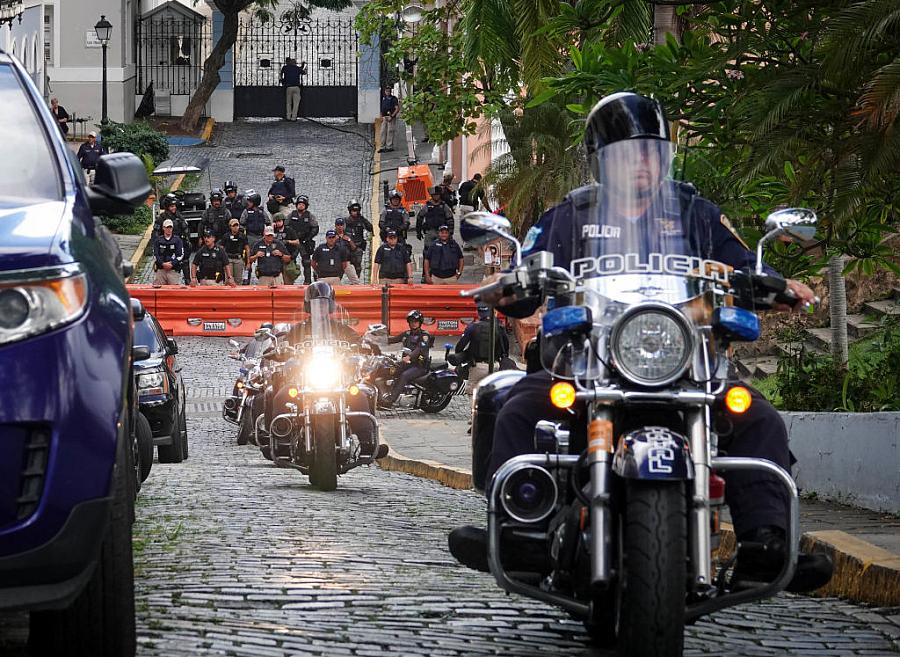How have federally mandated reforms impacted the way Puerto Rico Police respond to mental health crises?

Photo by Angel Valentin/Getty Images
It has been a decade since the Puerto Rico Bureau of Police was placed under a federal consent decree due to staggering revelations of continuous violations of civil rights against civilians. Rates of abuse of force were particularly high against Afro-Puerto Ricans and people with substance abuse or mental health issues, the federal investigation found.
The Bureau is the second largest police force in the U.S., with over 17,000 officers, and presides over the entire island, often responding instead of or alongside local municipal police officers.
On the island, a two-decades long fiscal crisis, natural disasters, and historic colonial practices have debilitated support systems for mentally ill individuals. Without access to robust, affordable services, people struggling with mental illness and their families often resort to calling upon police. And documents show those calls often end in violence, involuntary commitment to overburdened psychiatric hospitals or both.
As part of reforms mandated under the consent decree, a small group of police officers received training to improve their deescalation skills and reduce the use of force in responding to mental health crises. However, the program has yet to be expanded more broadly, as was expected.
In our project for the Center for Health Journalism 2023 National Fellowship, we are analyzing police use of force reports and other public records to understand how reforms instituted under the consent decree have impacted the way police treat people with mental illness in times of crisis.
In the first two months of researching and reporting this story as a team, we have already uncovered persistent challenges such as the lack of public services in Puerto Rico, the overuse of tasers by police officers and a deeply rooted stigma towards people with severe mental illness.
The Puerto Rican government operates a central mental health support hotline called Línea PAS through a call center in San Juan, the capital. The line can be reached 24 hours a day, seven days a week at 1-800-981-0023.
Last year, Línea PAS launched the 988 crisis line, the same three-digit number that has been presented in some U.S. cities as an alternative to dialing 911 in times of mental health crisis. In Puerto Rico, though, a call to 988 leads to the same call takers that run the main hotline.
A call to 988 is referred to 911 when the safety of the caller or someone else is at risk, Línea PAS Director Dr. Monserrate Allende said. The 988 call takers remain on the line to provide additional assistance, but it is police officers who show up to knock on the doors of individuals in need of mental health support.
Línea PAS also operates mobile crisis teams, but there are not enough to provide an immediate response to mental health emergencies across the island.
We are now digging deeper to understand how the 988 line and the mobile crisis teams work alongside police and what kind of impact this has for families who call for help. We have also requested data from the agency to better understand how widely the crisis line is used and how often the mobile crisis teams are dispatched.
Involuntary commitment, a legal mechanism that many advocates and scholars say should be used only in more severe situations, has become a central piece of the island’s bare-bones response to mental health support.
People who are involuntarily committed are held in psychiatric facilities for 24 hours to two weeks, depending on the situation, before a continuance of the order must be filed. However, there is no legal limit on how long the order can be continued, according to Puerto Rico law.
We are pushing for access to court documents that will allow us to see how often Puerto Rico’s involuntary commitment law has been used in recent years. We are also hoping to understand how often continuances are filed in these cases and how long people are held against their will in psychiatric hospitals.
Involuntary commitment should be regarded as an extreme intervention that is to be avoided, said Jamelia Morgan, professor of law and director of the Center for Racial and Disability Justice at Northwestern University.
Across the United States, the idea that “coercion is necessary” is built into the response to mental health at every level, Morgan said. Breaking this stigma along with the systems built around it is no small task and is still seen as a radical act, she said.
Local advocates have been pushing for a larger conversation around what a more progressive approach to mental health crisis response might look like in Puerto Rico. But others struggle to see a world in which police and involuntary commitment orders are not involved.
Moving forward, we will speak with mental health professionals, scholars, public officials and families who have been impacted by abuse of force by police officers. Ultimately, we hope the story may re-energize the conversation around mental health reform in Puerto Rico to make sure people are treated humanely in times of crisis.



